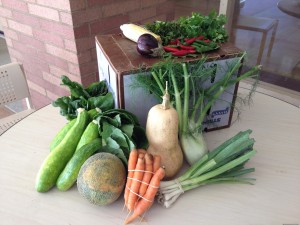Developing allergies to dairy and eggs forced Scarlettah Schaefer to start paying attention to food labels. She began to understand how much she still had to learn about where her food came from.
“I was always a foodie, but when I started reading labels, I realized there was a lot I didn’t (know),” Schaefer said.
The law student is the founder of the Food Law Society, a group that started this fall at the UCLA School of Law for students interested in food policy and providing healthy food to those who don’t have access to it.

“People ordered 30 boxes the first time,” Schaefer said. “We were so excited – it was much more than we expected.”
Schaefer said she especially enjoys the drop-offs because it helps make organic fruits and vegetables more accessible to students on campus.
Before she came to UCLA, Schaefer did not know that food law could be its own discipline.
Schaefer was inspired when she read a guide to food law in the Harvard Law Review that mentioned Michael Roberts, now the executive director of the Resnick Program for Food Law and Policy at the UCLA School of Law. Roberts became Schaefer’s faculty adviser for the club.
Schaefer began to think about food in a law context when she started researching Proposition 37, a California proposition that would have required explicit labeling of genetically modified foods.
She said her friends encouraged her to start the group after seeing her growing passion for food policy.
“Not everyone is interested in real estate or corporate law,” Schaefer said. “(But) everyone has an interest in what kinds of laws affect food. We all have to eat.”
Many members of the group come from backgrounds where food influenced their own personal growth.
“It is a very broad group. … (It’s) for people with a professional interest and a personal interest (in food),” Schaefer said.
One Food Law Society member, law student Makoto Chino, said he grew up around his father’s small organic vegetable farm. Food has always been important to him, he said.
Every day in the summer, he would wake up before 5 a.m. to work on his father’s farm.
“(But) when you see the plants grow, it’s worth it,” he said.
Geneva Thompson, communications chair for the Food Law Society, joined the group this year to find a community at UCLA. As an undergraduate student in Utah, she worked at a community garden to help provide nutritious food to those who did not have access to it.
“It’s so empowering to grow your own food,” Thompson said. “It wasn’t until I saw the social justice side (of food access) that I became a foodie.”
Schaefer said the next event for the Food Law Society is a dinner discussion on Oct. 24 called Food Sovereignty and the Raw Milk Debate. The group is also planning to volunteer at the E3 “Ecology, Economy, Equity” community garden in the Sunset Canyon Recreation Center on Oct. 27.
